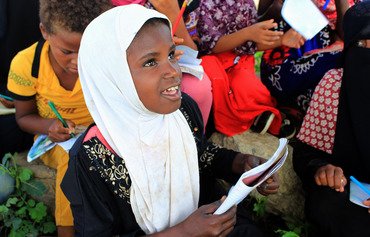Classrooms in Yemen's capital and Houthi-held north remained largely empty on the first official day of school Sunday (October 15th), as war, hunger and an economic collapse leave millions struggling to survive.
"The future of 4.5 million students hangs in the balance," Rajat Madhok, spokesman of the UN Children's Fund (UNICEF) in Yemen, told AFP.
A union strike over the suspension of teachers' salaries has ground education in areas controlled by the Iran-backed Houthis (Ansarallah) to a halt.
UNICEF estimates 13,146 schools, or 78% of all of Yemen's schools, have been hit by the salary crunch, many of them unable to open for the first day of school.
Nearly 500 schools have been destroyed by the conflict, repurposed as shelters or commandeered by armed factions in a war that has killed thousands and pushed the country to the brink of famine.
Schools in the capital Sanaa and across northern Yemen were forced to delay the September 30th start of the scholastic year by two weeks after the opposition fighters failed to pay teachers' salaries.
In government-held parts of Yemen, however, most schools this year opened as scheduled on October 1st.
'Starving' teachers
In Sanaa, 13-year-old Bashar al-Zaraji went to his school to register for classes on Sunday, but found himself looking straight at a locked door.
"I asked the school guard where everybody was. He told me the teachers were still on strike. They want their salaries," Zaraji said.
"So we are living in a country where we cannot study and nothing works," he said in exasperation. "What are we supposed to do?"
Younger pupils were in tears after waiting hours for their teachers to arrive, only to be left disappointed.
A handful of schools did open their doors to allow students to register for the year.
Others have taken to replacing teachers on strike with administrators loyal to the Houthis, a measure education experts say is far from sufficient to meet children's right to education.
"It is not only the issue of whether the schools open, but the quality of the teachers," said UNICEF's Madhok.
Nearly three quarters of Yemen's educators have not been paid for 12 months, according to UNICEF.
Teachers who struggled through a year with little to no pay say they will hold firm to their strike in the year to come.
"We are starving to death and they want us to teach?" said Abdel Hakim, a teacher in Sanaa.
"It is better to leave teaching and go look for work to feed my kids," he said.
Others have been moonlighting in other professions or looking to shift vocations altogether.
"For the past two years, I have gotten paid just half my old salary every two months," said teacher Mohammed Abdelrabb.
Children at risk
A bleeding education sector poses a major threat to the well-being of children, who are at increased risk of being recruited into militias, forced into labour or married off young, Madhok said.
The Houthis had promised teachers would be back in the classroom this school year.
The Iran-backed Houthis in 2014 drove the government out of Sanaa and south into Aden, hometown of President Abd Rabbu Mansour Hadi.
The Hadi government last year pulled the central bank from Sanaa to Aden, a move the UN said deprived more than one million civil servants -- including teachers -- of their salaries and pushed families toward starvation.
One principal in Sanaa said she decided to open her doors to her students on Sunday, regardless of whether any teachers actually showed up.
"If they stay home that will not stop us from receiving students," she said.
But some longtime residents of Sanaa said they were at their wits' end with the crumbling of the country's infrastructure, culminating in the paralysis of education.
"Since the Houthis came to Sanaa our salaries have been stolen, so has our health care, electricity and water" said Fahmi al-Sharabi, a 35-year-old resident of the capital.
"And now our children are being robbed of their education."

![A Yemeni girl holds a placard reading "Education is my frontline and I am not giving it up" during a demonstration outside of the UN office in the capital Sanaa, on September 17th. [Mohammed Huwais/AFP]](/cnmi_am/images/2017/10/16/10026-yemen-education-children-600_384.jpg)







Children lose their right to education. This is very dangerous as Egypt’s writer and dean of world literature Taha Hussein had said that education is like water and air.
Reply3 Comment(s)
May God protect us!
Reply3 Comment(s)
Egypt’s writer and dean of world literature Taha Hussein had said that education is like water and air. Any group that claims to be legitimate must not stop education or block it. If such a group fights education, it will be illegitimate.
Reply3 Comment(s)